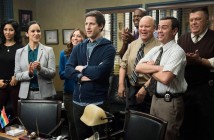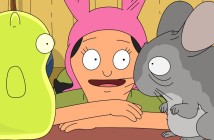Masters of Sex, Season 2, Episode 4, “Dirty Jobs”
August 3, 2014, 10:00 p.m. (EST), Showtime
After the brief, beauteous idyll of “Fight,” Masters of Sex returns to the cold hard light of day this week, as all of the characters are forced to contend with the idea of doing things that they find distasteful in the hopes of seeing a greater good achieved or, if nothing else, just getting through another day. “Dirty Jobs” is a rough, painful, difficult to watch hour of television, an exercise in cringe-comedy without the laughs. It’s also brutally, relentlessly effective, taking us from the leering fascination of Dr. Greathouse to the indifference of Dr. Papanicolaou to the predatory Virginia as she settles into a job hocking diet pills that seems increasingly like it might be her future. This was a hard hour of television to watch. It ecposed a number of very difficult truths and asked us to contend with their implications. It also moved this season forward by several paces, indicating the direction all of this is headed in as Bill leaves another hospital and finds himself across town, pitching Buell Green, an African American hospital, to take him on.
This ties into one of the most consistently uncomfortable elements of the season so far: Libby’s treatment of Coral. Watching Libby give some very stern lessons in enunciation was uncomfortable, but seeing her threaten Coral and force her into ruining her hairdo because it must have been Coral that gave the baby lice (even though Bill agrees that this is incredibly unlikely) was a whole different level of awful. It shouldn’t be that surprising that Libby Masters, a prim and proper housewife in the South of the late 1950’s might have some racial prejudice to deal with, but it does add layers to Bill’s unilateral decision to move to Buell Green. Libby is fine when she has the power in the situation. She can use passive aggression and outright threats of unemployment to make sure Coral does what she is told and stays in her place. But something tells me we’ve been increasingly exposed to this problematic part of Libby because she is about to experience the racial atmosphere of the segregated South from far closer than she might imagine.
It isn’t just the Masters’ household that is coming apart in “Dirty Jobs,” though. The beans are finally spilled for the Morettis, as Betty admits her infertility to Gene, and Gene admits that his wife isn’t the only one who started their relationship under false pretenses. Betty was playing the role of a “good Christian girl” because she wanted to marry Gene and make a better life for herself. But Gene met her at the brothel, in an encounter she can’t even recall but that made him believe in love and basic human kindness. It is an uncomfortable exchange, as Betty realizes a secret she thought she had put behind her may not be as gone as she’d imagined, and Gene both expresses his love for Betty as she really is and exposes himself as something different than he previously appeared to be. Much of Masters of Sex is about being closeted and presentation, even as only Barton Scully (who does not appear again this week due to Beau Bridges’ other commitments) and Betty herself is closeted in the way the term is generally used. Everyone on this show is hiding a part of themselves, trying to put on a face for the world that will let them fit in, that might make them acceptable in society. Yet the show returns again and again to a fundamental truth: real love, and real, lasting relationships are built on honesty, openness, and acceptance. No one is perfect. Everyone is a freak in their own way. The world around these characters has taught them to hide their oddities and put on a face of normalcy (unless, of course, they are as enmeshed in the patriarchal power scheme as Greathouse, who can be a pig and a pervert without any concern of exposure), but the secrets and the shame get to them all over time. They break these people down because no one should have to live in shame about who they are. No one should have to hide themselves from everyone around them. And that’s why, in an episode full of difficult conversations and awkward moments, the one that will last for me is that tense dinner between Betty and Gene. They’ve both been hiding from each other for a long time, but now, even if it hurts, they are coming clean (even if there are still some big, relationship defining secrets, like Betty’s lesbianism, kept hidden). And beneath all that shame and anxiety and fear, they find love.
Outside of that moment, and Bill’s outburst that costs him his job, the episode is full of people clinging to their masks, pushing them harder and harder, hoping they’ll eventually fit faces for which they are poorly shaped. Libby cannot gain any ground against her immovable object of a husband, so she exerts control over Coral in a vain attempt to make her house appear normal, her marriage functional, and her family unit a perfect 1950’s American ideal. Virginia rages against the script she is given in her job selling diet pills, but then she finds herself conforming to it anyway as things become more desperate and she starts to think this might become her permanent source of income. These women are trapped by the roles they are told to play and trapped by notions of what those roles, and what femininity itself is supposed to mean. Libby nearly breaks down over Johnny contracting lice, and Virginia panics when she discovers DePaul gave her study away right under Virginia’s nose. But neither of them has the power to change what’s really bothering them. They’re both hemmed in by what is expected of them, and yes, by their associations with Bill Masters, who has a power over them that he does not hesitate to exert, but which might make him uncomfortable if he saw it’s full scope.
Here’s the thing about Masters of Sex, and about period pieces more generally, that I think often gets missed. Yes, this is a show about a culture of repression and a social approach to human sexuality that existed in the 1950’s (and, should the show last, far beyond that). But this is not really a series about how quaint things were back then (just as people who saw Mad Men’s mining the ‘60s for humor early in its run as glib seem to have missed a lot of what the show was saying about how little has changed): Masters of Sex is very much about how we live now. “Dirty Jobs” may have its unseemly details rooted in a specific time and place, but its message is one that will always be resonant, so long as human beings try to control the beings of those around them. Fear, shame, and repression cause serious psychic scarring, long term wounds that may never really heal. But acceptance is a salve that can reduce the pain, honesty and authenticity balms for those aches. We cannot be who we are expected to be. We can only be who we are, and try to live in the world in a way that allows us to be respected for that and not castigated. We can fight the script, but also, sometimes, we need to drop the roles entirely. Sometimes, we need to find a way to just be, and a person, or a place, that will see that and think it’s enough. And maybe even think its perfect.
The Roundup
- “We don’t sleep here. Or read. This isn’t a vacation.”
- “I don’t feel comfortable working from a script that makes women feel bad about themselves.” “And yet women who feel good about themselves don’t buy diet products. Which leaves us with a conundrum.”
- “Old men masturbating!”
- “I will not tell a patient he is sterile when I know well and good the only reason he can’t conceive is because his wife underwent a tubal ligation…” But no problem telling your wife she is infertile, Bill?
- “How long have you known?” “So…long…Very long.”
- “You mean like in wrestling?” “Something like that.”
- “I never thought you were a good Christian girl. I just thought you were the love of my life.”
“Dirty Jobs” is a rough, painful, difficult to watch hour of television, an exercise in cringe-comedy without the laughs. It’s also brutally, relentlessly effective
-
GOOD




